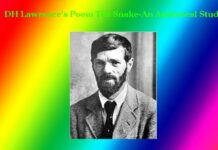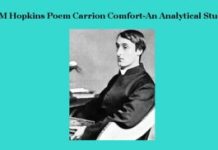Mystic Note in Walt Whitman’s Poetry
Mystic Note in Walt Whitman’s Poetry
Mystic Note in Walt Whitman’s Poetry
Generally, the word ‘Mystic’ denotes something obscure or hidden. But when it becomes an ‘ism’ in literature and scripture it refers to some spiritual doctrine that believes that there is only one immortal supreme or central soul which expresses itself through the objects of Nature and a human soul can make a spiritual communication with the Supreme Soul not physically but spiritually, not intellectually but through belief under some conditions such as—purgation of sin, temperate way of living, i.e. mortification or conquering of the senses or physical appetites and meditation on God. In other words, a mystic is he who believes: in only one Divine Soul (the soul of God), in the immortality of the soul with its all-pervading nature of it, and in the capacity of the human soul to make a communication with the Divine Soul. Mysticism is the highest stage of spiritual or religious thoughts. In Indian scriptures, there is an ample allusion to this mysticism and the ancient Indian sages claimed to have mystic experiences. But in modern times especially during the Romantic Era of English Literature, ‘mysticism’ came to be used as a literary term and many romantic poets had written poetry on the mystic theme. In America, some poets and philosophers created poetry on mystic themes. Amongst them, the name of Ralf Waldo Emerson, Emily Dickinson and Walt Whitman are worth mentioning. Being influenced by the English romantic poets, the Hindu Scriptures, and Emerson’s writings, Walt Whitman (1819 – 1892) composed many poems on mystic themes. So a strong note of mysticism is present in the bulk of Walt Whitman’s poetry. Like a true mystic, he believes that there is one Supreme Soul (God) which expresses itself through the objects of Nature and a human can make a communication with the Divine Soul and thus both soul can be united. However Walt Whitman’s notion of a mystic union of the human soul with God’s soul is somewhat different. He thought that spiritual union with the Divine Soul and the human soul might be established without sacrificing or conquering the senses and appetites. In other words, a man living a wild and wayward life also has a spiritual relationship with the Soul of God.
This queer blending of the fusion of spiritualism and sensualism runs throughout his famous sequence of mystic poems entitled ‘Songs of Myself’. In section 5 of Songs of Myself, the poet claims to have intimate contact with the Soul of God. In it, he says that the Soul of God appears to him as a close friend who sleeps with the poet in his bed and behaves with the poet as a beloved. The poet says:
”I believe in you my soul, the other
I am must not abase itself to you
…………………………………..
I mind how once we lay such a transparent
summer morning,
How you settled your head athwart my hips
and gently turned over upon me.
And parted the shirt from my bosom-bone,
And plunged your tongue to my bare-strip heart
And reached till you felt my beard, and reached
till you held my feet.
Swiftly arose and spread around me
the peace and knowledge that pass all the
argument of the earth.”
The above-quoted lines reveal the poet’s mystic experience, no doubt but the sexual purport of these lines are visible and it denotes that the poet takes God as his intimate friend with whom he had great intimacy.
In the same poem, the poet continues to say that God expresses Himself through His creations, especially through humans and so the poet thinks of God to be his own brother. He says:
”And I know that the hand of God is the
promise of my own,
And I know that spirit of God is the brother of my own.
And then all the men ever born are also my brothers
and women my sisters and lovers.”
In section 6 of ‘Song of Myself’, the poet symbolically regards the grass as ‘the handkerchief of the Lord’ and the smallest sprout of nature shows that everything is immortal. He says that nothing or no man dies—everything or everybody units with God’s soul through the death of the physical body. Hence death is only a medium through which every being gets immortality. In the words of the poet:
”The smallest sprout shows there is really no death
And if ever there was it led forward life
and does not wait at the end to arrest it.
And ceased the moment life appeared.
All goes onward and outward nothing collapses.
And to die is different from what anyone
supposed and luckier.”
In section 11 of’ Song of Myself,’ the poet gives a very sensuous description of twenty-eight young men bathing in the sea upon whom an unseen hand of a young lady passes over. The description has an amorous connotation but the mystical connotation is not ignorable. The poet says:
”Twenty-eight young men bathe by the shore
……………………………………………….
And unseen hand also passed over their bodies.”
In the same poem section-24, the poet says that he believes in the flesh and appetites but at the same time he believes that both flesh and soul are heavenly i.e. Divine. He is as holy as the Divine soul. In his own words:
”I believe in flesh and appetites
Seeing, hearing, feelings are miracles,
And each part and tag of me is a miracle
Divine am I and out and I make holy
Whatever I touch or am touched from.”
In the same section, he goes on to say that the human body is as sacred as the soul. The human body is finer and better than the Churches, Bibles and all Creeds. The poet sings:
”The scent of this arm-pits aroma finer than prayer.
This head more than churches, bibles, and all creeds.
If I worship one thing more than another
It shall be the spread of my own body or any part of it.”
The poet thinks that as God expresses Himself through humans so the human body is not inferior to the soul. He says:
”I am the poet of the body and I am the poet of the soul
The pleasure of heaven and the pains of hell are with me.”
The section-25 of ‘Song of Myself’ is replete with the poet’s mystic experience and mystic view that his soul and voice keep communication with the Divine Soul. The objects of nature are nothing but God Himself and as God’s soul and the human soul are the same, hence there is no difference between the soul of the poet and of the objects of nature. He says:
‘‘Dazzling and tremendous how quick the sunrise would
kill me,
If I could not know and always send sunrise out of me
………………………………………………………….
………………………………………………………….
My voice goes after what my eyes cannot reach
With the twirl of my tongue, I encompass worlds and volumes of worlds
Speech is the twin of my vision; it is unequal to measure itself.”
The poet in section 28 of the same poem says that he has experienced the touch of an invisible hand in her body that awakens in him a new identity:
”Is this then a touch? Quivering me to a new identity
Flames and ether making a rush for my veins
…………………………………………………
My flesh and blood playing out lightning
to strike what is hardly different from myself.”
In section 31 of ‘Song of Myself,’ the poet deliberately admits, like a true mystic, that God is perfect and all its creations are perfect like God Himself as the perfectness of God lies within the objects of Nature. He says:
‘‘I believe a leaf of grass is no less than the
journey work of the stars,
And the pismire is equally perfect, and a
grain of sand and the egg of the wren.”
In the poem ‘I Sing the Body Electric’ the poet sings the glory of the human body as he thinks that the Divine soul lives there:
”If anything is sacred the human body is sacred.
…………………………………………………..
All attitude all shapeliness, all the
belonging of my or your body or any one’s
body male or female…..
the womb, the tears, nipples, breast milk, tears laughers.”
”The Passage to India” is another poem the theme of which is his mystic journey from west to east and in the poem he says that God is all-pervading and he masters Nature, Death, Space etc.
‘‘Swiftly I shrivel at the thought of God
At Nature and its wonders, Time and Space and Death.
But that I, turning, call to thee O soul than actual me
And to thou gently masterest the orb.
……………………………………..
And fillest, sweetest full the vastness of space.”
In the poem ‘Song of the Open Road’ he openly admits, like a deliberate mystic, that in everything of Nature there are Divine things that are more beautiful than their physical beauty. He says:
”Be not discouraged, keep on, there are
divine things well enveloped,
I swear to you there are divine things
more beautiful than words can tell.”
In the poem ‘Chanting the Square Deific’, Whitman gives a clear-cut description of his ultimate mystic view on life and the human soul. He says boldly that he is all including God within himself. He says:
”Chanting the square deific out of one advancing
out of the sides,
Out of the old and new, out of the square entirely divine.
………………………………………….
Old Brahm I, and I Saturnines am.”
Again in the same poem, the poet says that he is the microcosm in himself. He is Christ, he is Hermes, he is Hercules:
”From this side, to the Lord Christ gazes—lo!
Hermes I lo! Mine is Hercules face
All sorrow, labour……absorb in myself
Many time times I have been rejected, taunted
Put in prison and crucified and many times
shall be again.
And the world have I given up for my dear
Brothers’ and sisters’ sake for the soul’s sake.”
Again in the poem he runs on to tell the same tenet as:
”Santa, Spirita breather life,
Beyond the light, lighter than light
Beyond the flame of hell, joyous leaping
easily above hell
Beyond Paradise perfumed solely with mine
own perfume.
Including life on earth, touching, including God,
including saviour and Satan.
Ethereal, pervading all (for without me what were all?
What were God?)
Essence of forms life of the real identities
Permanent, positive (namely the unseen)
Life of the great round world, the sun and stars
and of man, I the general soul.”
Thus, through the bulk of Whitman’s poetry, the mystic note runs on vigorously like a book breaking off all the trees and hills on its path. There are many poets dealing with the mystic theme but among them, Walt Whitman is more explicit, more spontaneous, more violent and more whimsical. 0 0 0 Mystic Note in Walt Whitman’s Poetry
Mystic Note in Walt Whitman’s Poetry
N.B. The article ‘Mystic Note in Walt Whitman’s Poetry’ originally belongs to the book ‘Walt Whitman’s Poetry A Thematic Study‘ by Menonim Mennimus. Mystic Note in Walt Whitman’s Poetry











